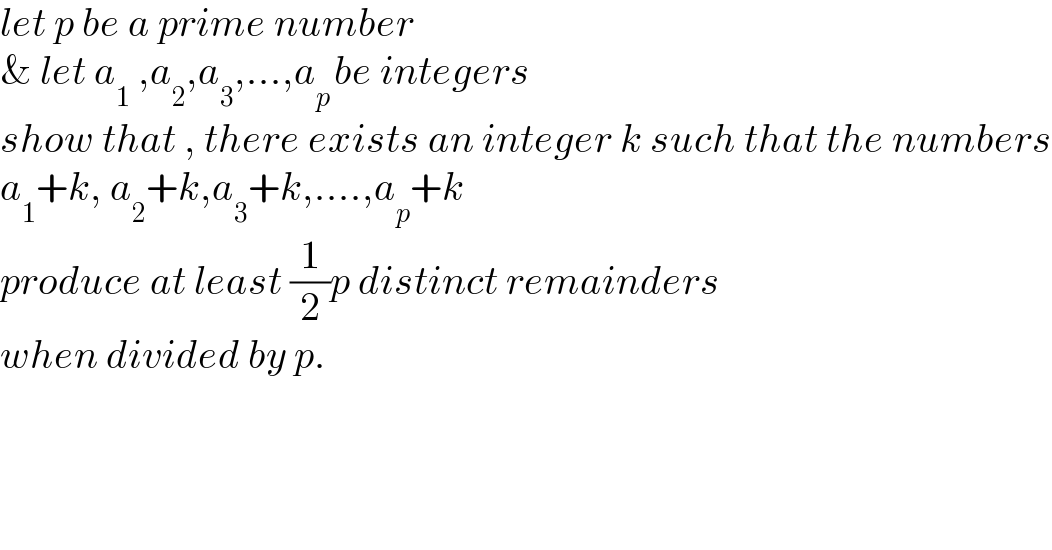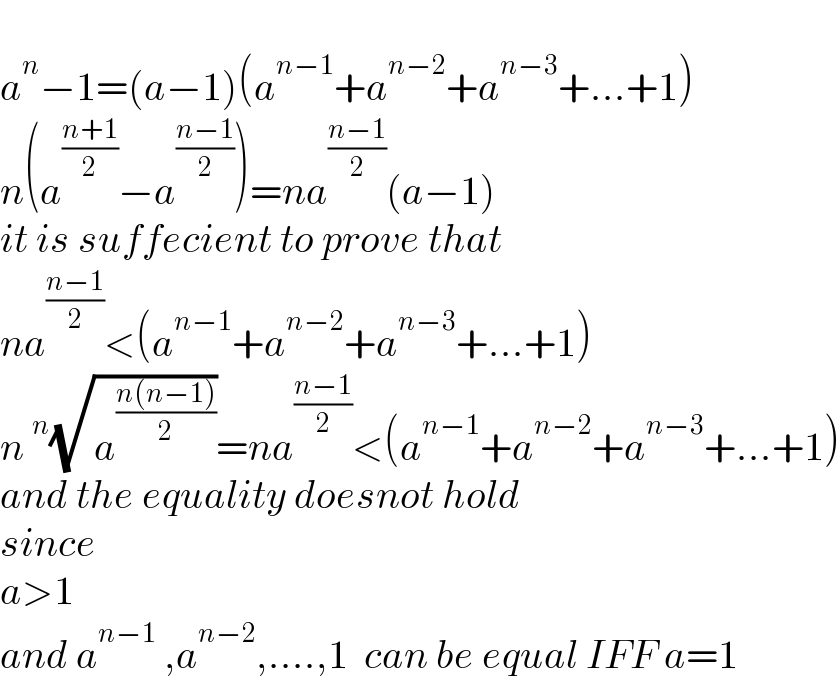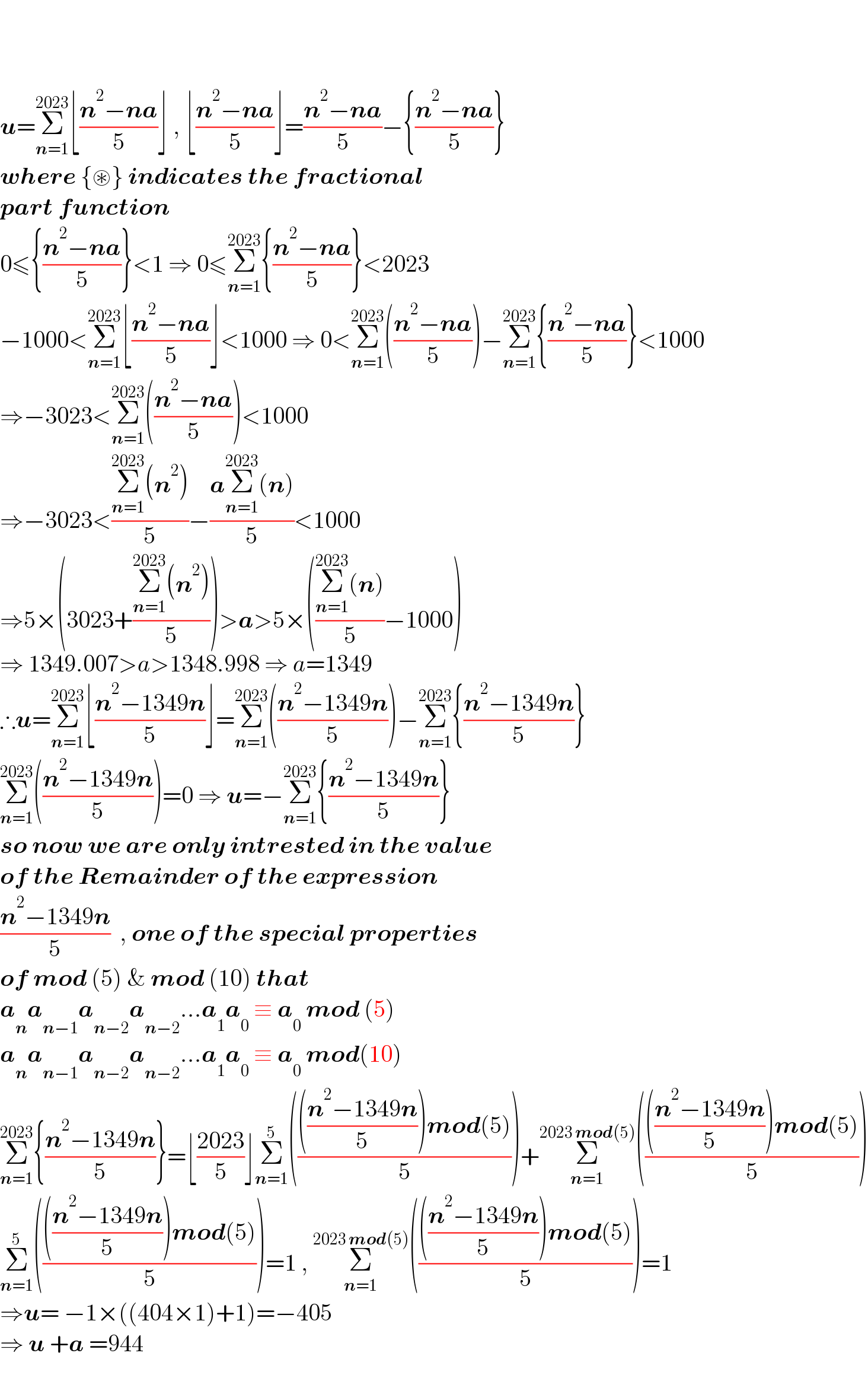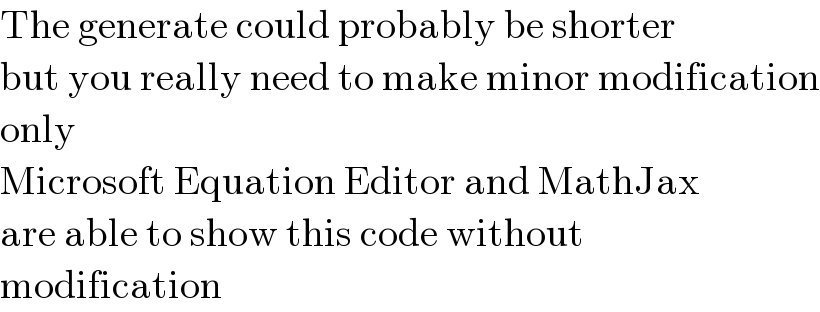
Question Number 194710 by York12 last updated on 14/Jul/23

$${let}\:{p}\:{be}\:{a}\:{prime}\:{number} \\ $$$$\&\:{let}\:{a}_{\mathrm{1}} \:,{a}_{\mathrm{2}} ,{a}_{\mathrm{3}} ,...,{a}_{{p}\:} {be}\:{integers} \\ $$$${show}\:{that}\:,\:{there}\:{exists}\:{an}\:{integer}\:{k}\:{such}\:{that}\:{the}\:{numbers} \\ $$$${a}_{\mathrm{1}} +{k},\:{a}_{\mathrm{2}} +{k},{a}_{\mathrm{3}} +{k},....,{a}_{{p}} +{k} \\ $$$${produce}\:{at}\:{least}\:\frac{\mathrm{1}}{\mathrm{2}}{p}\:{distinct}\:{remainders} \\ $$$${when}\:{divided}\:{by}\:{p}. \\ $$
Commented by Tinku Tara last updated on 14/Jul/23

$$\mathrm{Question}\:\mathrm{isnt}\:\mathrm{clear} \\ $$$$\mathrm{a}_{\mathrm{1}} ={p},{a}_{\mathrm{2}} =\mathrm{2}{p},{a}_{\mathrm{3}} =\mathrm{3}{p},...,{a}_{{p}} ={p}^{\mathrm{2}} \\ $$$$\mathrm{They}\:\mathrm{all}\:\mathrm{produce}\:\left(\mathrm{k}\:\mathrm{mod}\:\mathrm{p}\right)\:\mathrm{as} \\ $$$$\mathrm{remainder}\:\mathrm{when}\:\mathrm{k}\:\mathrm{is}\:\mathrm{added}\:\mathrm{and}\:\mathrm{divided}\:\mathrm{by}\:\mathrm{p} \\ $$
Commented by York12 last updated on 14/Jul/23

$${sir}\:{are}\:{you}\:{the}\:{owner}\:{of}\:{the}\:{app} \\ $$
Commented by York12 last updated on 14/Jul/23

$${if}\:{so}\:{please}\:{work}\:{on}\:{converting}\:{into}\: \\ $$$${latex}\:{tool} \\ $$$${it}\:{produces}\:{wrong}\:{latax}\:{codes} \\ $$$$ \\ $$
Commented by Tinku Tara last updated on 14/Jul/23

$$\mathrm{Type}\:\mathrm{the}\:\mathrm{equation}\:\mathrm{that}\:\mathrm{generated} \\ $$$$\mathrm{wrong}\:\mathrm{latex}\:\mathrm{as}\:\mathrm{comment}\:\mathrm{here}\:\mathrm{and} \\ $$$$\mathrm{and}\:\mathrm{we}\:\mathrm{will}\:\mathrm{check}. \\ $$
Commented by York12 last updated on 14/Jul/23

$${okay}\:{sir}\:{thanks} \\ $$$$ \\ $$$$ \\ $$$$ \\ $$
Commented by Tinku Tara last updated on 14/Jul/23
You can visit Https://www.tinkutara.com. The web site has the same forum displayed as latex.
Commented by York12 last updated on 14/Jul/23

$${okay}\:{sir}\:{I}\:{will}\:{check} \\ $$
Commented by York12 last updated on 14/Jul/23

$$ \\ $$$${a}^{{n}} −\mathrm{1}=\left({a}−\mathrm{1}\right)\left({a}^{{n}−\mathrm{1}} +{a}^{{n}−\mathrm{2}} +{a}^{{n}−\mathrm{3}} +...+\mathrm{1}\right) \\ $$$${n}\left({a}^{\frac{{n}+\mathrm{1}}{\mathrm{2}}} −{a}^{\frac{{n}−\mathrm{1}}{\mathrm{2}}} \right)={na}^{\frac{{n}−\mathrm{1}}{\mathrm{2}}} \left({a}−\mathrm{1}\right) \\ $$$${it}\:{is}\:{suffecient}\:{to}\:{prove}\:{that} \\ $$$${na}^{\frac{{n}−\mathrm{1}}{\mathrm{2}}} <\left({a}^{{n}−\mathrm{1}} +{a}^{{n}−\mathrm{2}} +{a}^{{n}−\mathrm{3}} +...+\mathrm{1}\right) \\ $$$${n}\:^{{n}} \sqrt{{a}^{\frac{{n}\left({n}−\mathrm{1}\right)}{\mathrm{2}}} }={na}^{\frac{{n}−\mathrm{1}}{\mathrm{2}}} <\left({a}^{{n}−\mathrm{1}} +{a}^{{n}−\mathrm{2}} +{a}^{{n}−\mathrm{3}} +...+\mathrm{1}\right) \\ $$$${and}\:{the}\:{equality}\:{doesnot}\:{hold} \\ $$$${since} \\ $$$${a}>\mathrm{1} \\ $$$${and}\:{a}^{{n}−\mathrm{1}} \:,{a}^{{n}−\mathrm{2}} ,....,\mathrm{1}\:\:{can}\:{be}\:{equal}\:{IFF}\:{a}=\mathrm{1} \\ $$
Commented by York12 last updated on 14/Jul/23

$$ \\ $$$$ \\ $$$$ \\ $$$$\boldsymbol{{u}}=\underset{\boldsymbol{{n}}=\mathrm{1}} {\overset{\mathrm{2023}} {\sum}}\lfloor\frac{\boldsymbol{{n}}^{\mathrm{2}} −\boldsymbol{{na}}}{\mathrm{5}}\rfloor\:,\:\lfloor\frac{\boldsymbol{{n}}^{\mathrm{2}} −\boldsymbol{{na}}}{\mathrm{5}}\rfloor=\frac{\boldsymbol{{n}}^{\mathrm{2}} −\boldsymbol{{na}}}{\mathrm{5}}−\left\{\frac{\boldsymbol{{n}}^{\mathrm{2}} −\boldsymbol{{na}}}{\mathrm{5}}\right\} \\ $$$$\boldsymbol{{where}}\:\left\{\circledast\right\}\:\boldsymbol{{indicates}}\:\boldsymbol{{the}}\:\boldsymbol{{fractional}}\: \\ $$$$\boldsymbol{{part}}\:\boldsymbol{{function}}\: \\ $$$$\mathrm{0}\leqslant\left\{\frac{\boldsymbol{{n}}^{\mathrm{2}} −\boldsymbol{{na}}}{\mathrm{5}}\right\}<\mathrm{1}\:\Rightarrow\:\mathrm{0}\leqslant\underset{\boldsymbol{{n}}=\mathrm{1}} {\overset{\mathrm{2023}} {\sum}}\left\{\frac{\boldsymbol{{n}}^{\mathrm{2}} −\boldsymbol{{na}}}{\mathrm{5}}\right\}<\mathrm{2023} \\ $$$$−\mathrm{1000}<\underset{\boldsymbol{{n}}=\mathrm{1}} {\overset{\mathrm{2023}} {\sum}}\lfloor\frac{\boldsymbol{{n}}^{\mathrm{2}} −\boldsymbol{{na}}}{\mathrm{5}}\rfloor<\mathrm{1000}\:\Rightarrow\:\mathrm{0}<\underset{\boldsymbol{{n}}=\mathrm{1}} {\overset{\mathrm{2023}} {\sum}}\left(\frac{\boldsymbol{{n}}^{\mathrm{2}} −\boldsymbol{{na}}}{\mathrm{5}}\right)−\underset{\boldsymbol{{n}}=\mathrm{1}} {\overset{\mathrm{2023}} {\sum}}\left\{\frac{\boldsymbol{{n}}^{\mathrm{2}} −\boldsymbol{{na}}}{\mathrm{5}}\right\}<\mathrm{1000} \\ $$$$\Rightarrow−\mathrm{3023}<\underset{\boldsymbol{{n}}=\mathrm{1}} {\overset{\mathrm{2023}} {\sum}}\left(\frac{\boldsymbol{{n}}^{\mathrm{2}} −\boldsymbol{{na}}}{\mathrm{5}}\right)<\mathrm{1000} \\ $$$$\Rightarrow−\mathrm{3023}<\frac{\underset{\boldsymbol{{n}}=\mathrm{1}} {\overset{\mathrm{2023}} {\sum}}\left(\boldsymbol{{n}}^{\mathrm{2}} \right)}{\mathrm{5}}−\frac{\boldsymbol{{a}}\underset{\boldsymbol{{n}}=\mathrm{1}} {\overset{\mathrm{2023}} {\sum}}\left(\boldsymbol{{n}}\right)}{\mathrm{5}}<\mathrm{1000} \\ $$$$\Rightarrow\mathrm{5}×\left(\mathrm{3023}+\frac{\underset{\boldsymbol{{n}}=\mathrm{1}} {\overset{\mathrm{2023}} {\sum}}\left(\boldsymbol{{n}}^{\mathrm{2}} \right)}{\mathrm{5}}\right)>\boldsymbol{{a}}>\mathrm{5}×\left(\frac{\underset{\boldsymbol{{n}}=\mathrm{1}} {\overset{\mathrm{2023}} {\sum}}\left(\boldsymbol{{n}}\right)}{\mathrm{5}}−\mathrm{1000}\right) \\ $$$$\Rightarrow\:\mathrm{1349}.\mathrm{007}>{a}>\mathrm{1348}.\mathrm{998}\:\Rightarrow\:{a}=\mathrm{1349} \\ $$$$\therefore\boldsymbol{{u}}=\underset{\boldsymbol{{n}}=\mathrm{1}} {\overset{\mathrm{2023}} {\sum}}\lfloor\frac{\boldsymbol{{n}}^{\mathrm{2}} −\mathrm{1349}\boldsymbol{{n}}}{\mathrm{5}}\rfloor=\underset{\boldsymbol{{n}}=\mathrm{1}} {\overset{\mathrm{2023}} {\sum}}\left(\frac{\boldsymbol{{n}}^{\mathrm{2}} −\mathrm{1349}\boldsymbol{{n}}}{\mathrm{5}}\right)−\underset{\boldsymbol{{n}}=\mathrm{1}} {\overset{\mathrm{2023}} {\sum}}\left\{\frac{\boldsymbol{{n}}^{\mathrm{2}} −\mathrm{1349}\boldsymbol{{n}}}{\mathrm{5}}\right\} \\ $$$$\underset{\boldsymbol{{n}}=\mathrm{1}} {\overset{\mathrm{2023}} {\sum}}\left(\frac{\boldsymbol{{n}}^{\mathrm{2}} −\mathrm{1349}\boldsymbol{{n}}}{\mathrm{5}}\right)=\mathrm{0}\:\Rightarrow\:\boldsymbol{{u}}=−\underset{\boldsymbol{{n}}=\mathrm{1}} {\overset{\mathrm{2023}} {\sum}}\left\{\frac{\boldsymbol{{n}}^{\mathrm{2}} −\mathrm{1349}\boldsymbol{{n}}}{\mathrm{5}}\right\} \\ $$$$\boldsymbol{{so}}\:\boldsymbol{{now}}\:\boldsymbol{{we}}\:\boldsymbol{{are}}\:\boldsymbol{{only}}\:\boldsymbol{{intrested}}\:\boldsymbol{{in}}\:\boldsymbol{{the}}\:\boldsymbol{{value}} \\ $$$$\boldsymbol{{of}}\:\boldsymbol{{the}}\:\boldsymbol{{Remainder}}\:\boldsymbol{{of}}\:\boldsymbol{{the}}\:\boldsymbol{{expression}} \\ $$$$\frac{\boldsymbol{{n}}^{\mathrm{2}} −\mathrm{1349}\boldsymbol{{n}}}{\mathrm{5}}\:\:,\:\boldsymbol{{one}}\:\boldsymbol{{of}}\:\boldsymbol{{the}}\:\boldsymbol{{special}}\:\boldsymbol{{properties}} \\ $$$$\boldsymbol{{of}}\:\boldsymbol{{mod}}\:\left(\mathrm{5}\right)\:\&\:\boldsymbol{{mod}}\:\left(\mathrm{10}\right)\:\boldsymbol{{that}}\: \\ $$$$\boldsymbol{{a}}_{\boldsymbol{{n}}} \boldsymbol{{a}}_{\boldsymbol{{n}}−\mathrm{1}} \boldsymbol{{a}}_{\boldsymbol{{n}}−\mathrm{2}} \boldsymbol{{a}}_{\boldsymbol{{n}}−\mathrm{2}} ...\boldsymbol{{a}}_{\mathrm{1}} \boldsymbol{{a}}_{\mathrm{0}} \:\equiv\:\boldsymbol{{a}}_{\mathrm{0}} \:\boldsymbol{{mod}}\:\left(\mathrm{5}\right) \\ $$$$\boldsymbol{{a}}_{\boldsymbol{{n}}} \boldsymbol{{a}}_{\boldsymbol{{n}}−\mathrm{1}} \boldsymbol{{a}}_{\boldsymbol{{n}}−\mathrm{2}} \boldsymbol{{a}}_{\boldsymbol{{n}}−\mathrm{2}} ...\boldsymbol{{a}}_{\mathrm{1}} \boldsymbol{{a}}_{\mathrm{0}} \:\equiv\:\boldsymbol{{a}}_{\mathrm{0}} \:\boldsymbol{{mod}}\left(\mathrm{10}\right) \\ $$$$\underset{\boldsymbol{{n}}=\mathrm{1}} {\overset{\mathrm{2023}} {\sum}}\left\{\frac{\boldsymbol{{n}}^{\mathrm{2}} −\mathrm{1349}\boldsymbol{{n}}}{\mathrm{5}}\right\}=\lfloor\frac{\mathrm{2023}}{\mathrm{5}}\rfloor\underset{\boldsymbol{{n}}=\mathrm{1}} {\overset{\mathrm{5}} {\sum}}\left(\frac{\left(\frac{\boldsymbol{{n}}^{\mathrm{2}} −\mathrm{1349}\boldsymbol{{n}}}{\mathrm{5}}\right)\boldsymbol{{mod}}\left(\mathrm{5}\right)}{\mathrm{5}}\right)+\underset{\boldsymbol{{n}}=\mathrm{1}} {\overset{\mathrm{2023}\:\boldsymbol{{mod}}\left(\mathrm{5}\right)} {\sum}}\left(\frac{\left(\frac{\boldsymbol{{n}}^{\mathrm{2}} −\mathrm{1349}\boldsymbol{{n}}}{\mathrm{5}}\right)\boldsymbol{{mod}}\left(\mathrm{5}\right)}{\mathrm{5}}\right) \\ $$$$\underset{\boldsymbol{{n}}=\mathrm{1}} {\overset{\mathrm{5}} {\sum}}\left(\frac{\left(\frac{\boldsymbol{{n}}^{\mathrm{2}} −\mathrm{1349}\boldsymbol{{n}}}{\mathrm{5}}\right)\boldsymbol{{mod}}\left(\mathrm{5}\right)}{\mathrm{5}}\right)=\mathrm{1}\:,\:\underset{\boldsymbol{{n}}=\mathrm{1}} {\overset{\mathrm{2023}\:\boldsymbol{{mod}}\left(\mathrm{5}\right)} {\sum}}\left(\frac{\left(\frac{\boldsymbol{{n}}^{\mathrm{2}} −\mathrm{1349}\boldsymbol{{n}}}{\mathrm{5}}\right)\boldsymbol{{mod}}\left(\mathrm{5}\right)}{\mathrm{5}}\right)=\mathrm{1} \\ $$$$\Rightarrow\boldsymbol{{u}}=\:−\mathrm{1}×\left(\left(\mathrm{404}×\mathrm{1}\right)+\mathrm{1}\right)=−\mathrm{405} \\ $$$$\Rightarrow\:\boldsymbol{{u}}\:+\boldsymbol{{a}}\:=\mathrm{944}\: \\ $$
Commented by York12 last updated on 14/Jul/23

$${and}\:{I}\:{hope}\:{if}\:{you}\:{can}\:{add}\:{some}\:{codes}\:{for} \\ $$$${text}\:{colour} \\ $$
Commented by Tinku Tara last updated on 14/Jul/23

$$\mathrm{for}\:\mathrm{the}\:\mathrm{equation}\:\mathrm{with}\:{a}^{{n}} \:\mathrm{latex}\:\mathrm{is}\:\mathrm{correct} \\ $$$$\mathrm{tap}\:\mathrm{on}\:\mathrm{3}\:\mathrm{dots}\:\rightarrow\:{get}\:{latex} \\ $$$${paste}\:{latex}\:{in}\:{mathjax}\:{to}\:{validate} \\ $$
Commented by York12 last updated on 14/Jul/23

$${I}\:{was}\:{using}\:{overleaf} \\ $$$${okay}\:{sir}\:{I}\:{will}\:{try} \\ $$
Commented by Tinku Tara last updated on 14/Jul/23
https://www.mathjax.org/#demo
Commented by Tinku Tara last updated on 14/Jul/23

$$\mathrm{text}\:\mathrm{color}\:\mathrm{is}\:\mathrm{additional}\:\mathrm{latex}\:\mathrm{module}\:\mathrm{not} \\ $$$$\mathrm{supported}\:\mathrm{in}\:\mathrm{many}\:\mathrm{places}\:\mathrm{so}\:\mathrm{colors} \\ $$$$\mathrm{are}\:\mathrm{not}\:\mathrm{coded} \\ $$
Commented by York12 last updated on 14/Jul/23

$${okay}\:{sir}\:{thanks} \\ $$
Commented by York12 last updated on 18/Aug/23

$${sir}\:{cannot}\:{The}\:{generated}\:{Latex}\:{code}\:{be}\:{shorter} \\ $$
Commented by York12 last updated on 18/Aug/23

$${canot}\:{you}\:\:{make}\:{it}\:{gendrate}\: \\ $$$${latex}\:{using}\:{asmath}\:{package} \\ $$
Commented by Tinku Tara last updated on 18/Aug/23

$$\mathrm{The}\:\mathrm{generate}\:\mathrm{could}\:\mathrm{probably}\:\mathrm{be}\:\mathrm{shorter} \\ $$$$\mathrm{but}\:\mathrm{you}\:\mathrm{really}\:\mathrm{need}\:\mathrm{to}\:\mathrm{make}\:\mathrm{minor}\:\mathrm{modification} \\ $$$$\mathrm{only} \\ $$$$\mathrm{Microsoft}\:\mathrm{Equation}\:\mathrm{Editor}\:\mathrm{and}\:\mathrm{MathJax} \\ $$$$\mathrm{are}\:\mathrm{able}\:\mathrm{to}\:\mathrm{show}\:\mathrm{this}\:\mathrm{code}\:\mathrm{without} \\ $$$$\mathrm{modification} \\ $$
Commented by York12 last updated on 18/Aug/23

$${thanks} \\ $$
Commented by Tinku Tara last updated on 18/Aug/23

$$\mathrm{what}\:\mathrm{is}\:\mathrm{the}\:\mathrm{error}\:\mathrm{that}\:\mathrm{you}\:\mathrm{get}\:\mathrm{in} \\ $$$$\mathrm{asmath}? \\ $$
Commented by York12 last updated on 18/Aug/23

$${Ovearleaf}\:{was}\:{giving}\:{alerts}\:{for}\:{errors} \\ $$$${but}\:{it}\:{is}\:{okay}\:{now} \\ $$
